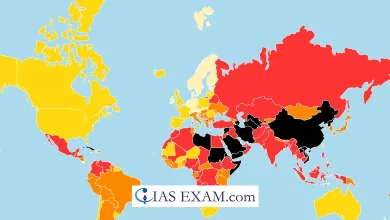Daily Current Affairs for UPSC
FSSAI to Initiate Action Against Nestle
Syllabus - Health [GS Paper-2]

Context
The Union Consumer Affairs Ministry has recently asked the Food Safety and Standards Authority of India (FSSAI) to initiate “appropriate action” against the Nestle group for allegedly selling baby products with high sugar content in India.
Key Highlights
- The Department has initiated this action following a report that the Nestle Company has allegedly added 2.7 grams of sugar per serving to their Cerelac infant cereals selling in India.
- The same corporation refrain from this practice in countries including Germany, Switzerland, France, and the United Kingdom.
- Concerns: High sugar content in baby products increases serious concerns about the ability implications for the health and safety of children in the country.
- Eliminating sugars from food products for infants might be an essential way to put in force early prevention of obesity.
- The WHO has warned that obesity is dramatically on the rise, mainly in low and middle income countries, in which it has now reached “epidemic proportions”, and is fuelling an growth of noncommunicable diseases such as cardiovascular disorder, cancer, and diabetes.
- Increased intake of mainly processed ingredients, frequently high in sugar content, is singled out as one of the essential reasons for this epidemic.
Ethical Duty of Food Companies Towards Consumers
- Safety and Health: Food corporations have an ethical obligation to prioritize the safety and health of consumers by generating and dispensing food products that meet high standards of safety and hygiene.
- Transparency and Truthfulness: Food companies have to provide accurate and reliable facts about their products and elements.
- Honest labeling and advertising help purchasers make informed choices and build trust in the brand.
- Nutritional Responsibility: Food businesses must prioritize the nutritional quality of their product and encourage healthy eating practices among purchasers.
- Consumer Engagement and Feedback: Food agencies should actively have interaction with customers, pay attention to their comments and concerns, and take appropriate moves to cope with them.
- Ethical Marketing and Advertising: Food businesses need to adhere to moral requirements in their advertising and advertising and marketing practices, avoiding misleading or deceptive tactics that may manipulate consumer behavior or misrepresent the qualities of their products.
- Corporate Accountability and Governance: Ethical food agencies uphold principles of company duty and governance, maintaining transparency in their commercial enterprise operations, economic practices, and choice-making techniques.
Food Safety Laws in India
- The first legislation regarding food security in India is the Food Safety and Standards Act, 2006 (FSS Act), which was enacted to consolidate diverse food laws in the country.
- Food Safety and Standards Authority of India (FSSAI): FSSAI is the highest body chargeable for formulating and enforcing food safety standards in India.
- It regulates and video display units the manufacture, processing, distribution, sale, and import of food merchandise to ensure they meet safety requirements.
- Food Safety and Standards Regulations (FSSR): The regulations provide exact hints and standards for numerous aspects of meals safety, including manufacturing practices, labeling, packaging, hygiene, contaminants, additives, and residues.
- Licensing and Registration: The FSS Act mandates that food companies gain licenses or registrations from FSSAI, relying on their scale and nature of operations.
- Food Labeling and Packaging: FSSAI regulations prescribe necessities for labeling and packaging of food products to provide correct data to consumers regarding ingredients, dietary content, shelf life, and other vital info.
- Food Import Regulations: Imported meals products need to observe Indian food safety standards and policies.
- Food Testing and Certification: FSSAI accredits laboratories for trying out food products to ensure compliance with safety requirements.
- Food products require certification from authorized laboratories before they are advertised or sole.
- Food Recall and Traceability: FSSAI has provisions for food don’t forget in case of safety issues or infection incidents.
- It also emphasizes traceability measures to track the flow of food products throughout the supply chain.
Conclusion
- The World Health Organisation (WHO) has for numerous years warned against the presence of high sugar content in child food products.
- Businesses operate for profit but the government should make certain the safety of its residents.
- Any laxity in the legal guidelines will ensure that the health of the citizens and in this case vulnerable infants gets compromised.
Source: Indian Express
UPSC Mains Practice Question
Q.Elaborate the policy taken by the Government of India to meet the challenges of the food processing sector. (2021)





.png)



